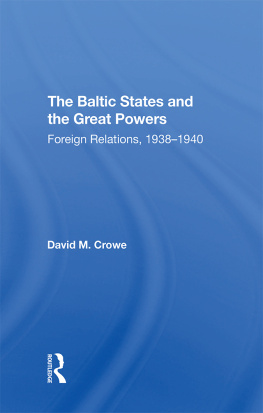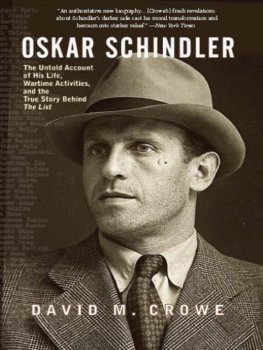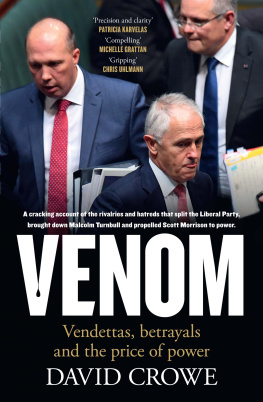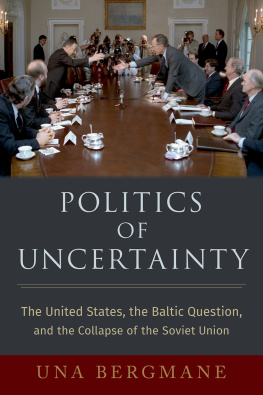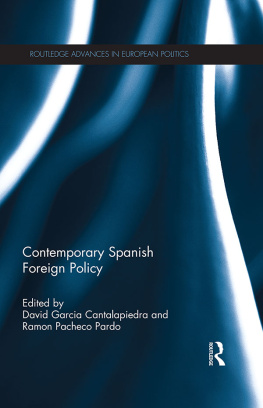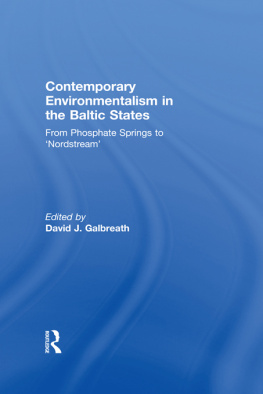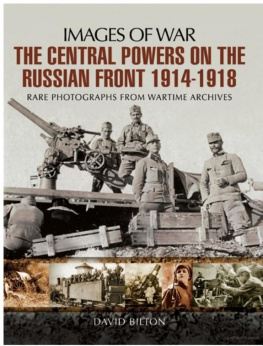The Baltic States and the Great Powers
The Baltic States and the Great Powers
Foreign Relations, 19381940
David M. Crowe
First published 1993 by Westview Press, Inc.
Published 2019 by Routledge
52 Vanderbilt Avenue, New York, NY 10017
2 Park Square, Milton Park, Abingdon, Oxon OX14 4RN
Routledge is an imprint of the Taylor & Francis Group, an informa business
Copyright 1993 Taylor & Francis
All rights reserved. No part of this book may be reprinted or reproduced or utilised in any form or by any electronic, mechanical, or other means, now known or hereafter invented, including photocopying and recording, or in any information storage or retrieval system, without permission in writing from the publishers.
Notice:
Product or corporate names may be trademarks or registered trademarks, and are used only for identification and explanation without intent to infringe.
Library of Congress Cataloging-in-Publication Data
Crowe, David.
The Baltic states and the great powers: foreign relations, 19381940 / David M. Crowe.
p. cm.
Includes bibliographies and index.
ISBN 0-8133-0481-4
1. Baltic StatesForeign relations. I. Title.
DK502.7.C76 1993
327.47'4'009043dc20 92-24988
CIP
ISBN 13: 978-0-367-29028-3 (hbk)
To Kathryn
- Photos
- Maps
- The Baltic States and the surrounding area
THE REACQUISITION OF BALTIC INDEPENDENCE in the aftermath of the August 18-21, 1991, coup in the former Soviet Union brought an end to a tragic episode in the rich history of Estonia, Latvia, and Lithuania. This book looks at the origins of their first attempt at nationhood and the significance of the relationship of these countries with the major powers from 1918-1940 on their history during that period. The idea for this work came as the result of graduate work done under Professor Victor S. Mamatey at the University of Georgia. Research on the subject continued over the years in Washington, London, the Soviet Union, and elsewhere and resulted in a number of publications on various aspects of Baltic history. The dramatic political transformations that swept the Soviet Union and the Baltic republics as a result of Mikhail Gorbachev's post-1985 reforms prompted me to begin work on this project. Once it became apparent, at least to those of us involved in Baltic studies over the past few decades, that the changes sweeping the Soviet Union would lead to a dramatic new status for the Baltic states, the need for this study became more pressing. Although some details, particularly those dealing with the Soviet conquest of the Baltic countries in 1940 were well known, little had been done, except by a small group of specialists, on their more complex international relationships. The significance of the Baltics as a buffer and avenue between Germany and the Soviet Union had always been acknowledged, though little was done to discuss their complex relationships with one another and the broader international community. Tragically, as this study shows, their fate from the outset of their efforts to acquire independence after World War I was tied to that of the two countries that played such an important role in destroying it twenty-two years laterSoviet Russia and Germany. This situation became particularly apparent by 1938. As the European scene heated up in the face of growing German aggression, the Baltic countries found themselves less and less in control of their own destiny. Diplomatic and military pressure was used time and again to force them gradually to abandon various aspects of their autonomy, culminating in their complete takeover by the USSR in the summer of 1940.
Yet this study is more than a mere look at power politics in Eastern Europe in 1938-1940. It also explores the historical and ethnic differences essential to an understanding of the complex and often unfathomable forces that have helped form the history of that region and continue to plague it. In addition, this work also looks at the powerful human forces that so deeply affected the history of Estonia, Latvia, and Lithuania. It underscores the dreams, ideals, and motivations of a number of important diplomats, politicians, and soldiers who molded the history of the Baltic states and the nations around them. Central to this story were Adolph Hitler and Joseph Stalin, whose fears and ambitions make up a major part of this tale, along with other important, though less well known, figures.
As in any work, the success of this book is directly tied to the support given by a number of individuals. I would first like to thank those unnamed specialists and their assistants at the Public Record Office in Chancery Lane and Kew who were so patient with me over the years, as well as a similar group in the National Archives of the United States. I would particularly like to thank Rodney A. Ross of the Center for Legislative Archives of the National Archives, who spent tireless hours preparing the freshly opened files of the House Select Committee on Communist Aggression for me. I would also like to thank Alexander S. Bulatov, of the USSR Academy of Foreign Trade, for the valuable primary sources he provided me during the course of my research and writing. Equally supportive has been my student assistant in the Department of History at Elon College, Heidi De Preiter, and the department's incomparable secretary, Brenda Cooper. I also salute Teresa LePors, the reference and public service librarian at the McEwen Library at Elon College, who again and again ran down sources in a number of languages essential to my work. I would also like to acknowledge Elon College's Research and Development Committee for its generous Summer Research Grant that enabled me to complete this project.
However, the most important person in this effort has been my intellectual companion and silent collaborator, Kathryn Moore Crowe, to whom this book is dedicated. Not only has she supported and encouraged me to complete it, she also played a major role in preparing the manuscript for final submission. Her efforts made the project much more enjoyable and meaningful.
David M. Crowe
THE EXCHANGE RATES during the period from 1938 to 1940 for the currencies mentioned in the text were fairly consistent and are listed below. The exchange rate for the German Reichsmark is given for 1928 as well as for 1938-1940.
| Estonia | Kroon (singular); Krooni (plural)
US$1 = 3.92 Krooni; 1 Kroon = 100 Sents |
| Latvia | Lat (singular); Latos (plural)
US$1 = 6.05 Latos; 1 Lat = 100 Sartimi |
| Lithuania | Litas (singular); Litai (plural)
US$1 = 6.05 Litai; 1 Litas = 100 Centu |
| Germany | Reichsmark(s)
1928: US$1 = 4.21 Reichsmarks
1938-1940: US$1 = 2.5 Reichsmarks |
1
Seeds of Discord: 19181938
THE BALTIC STATESEstonia, Latvia, and Lithuaniaemerged as independent nations at the end of World War I. Over the next twenty years, they struggled to create the political, economic, and social institutions necessary for survival in the chaotic interlude between the twentieth century's two world wars. The Baltic states also tried to develop diplomatic ties that complemented their tenuous geographical and strategic positions along the southeastern Baltic littoral and that would allow them to enjoy normal status in the international community. Domestic political immaturity as well as the abnormal swirl of events in Eastern Europe between 1918 and 1940, however, severely compromised the ability of their leaders to pursue completely independent foreign policies. In addition, Baltic leaders discovered that the two nations that had played such an important role in their history prior to independenceGermany and Russiathough temporarily crippled after World War I, would continue to play important roles in determining their future.



